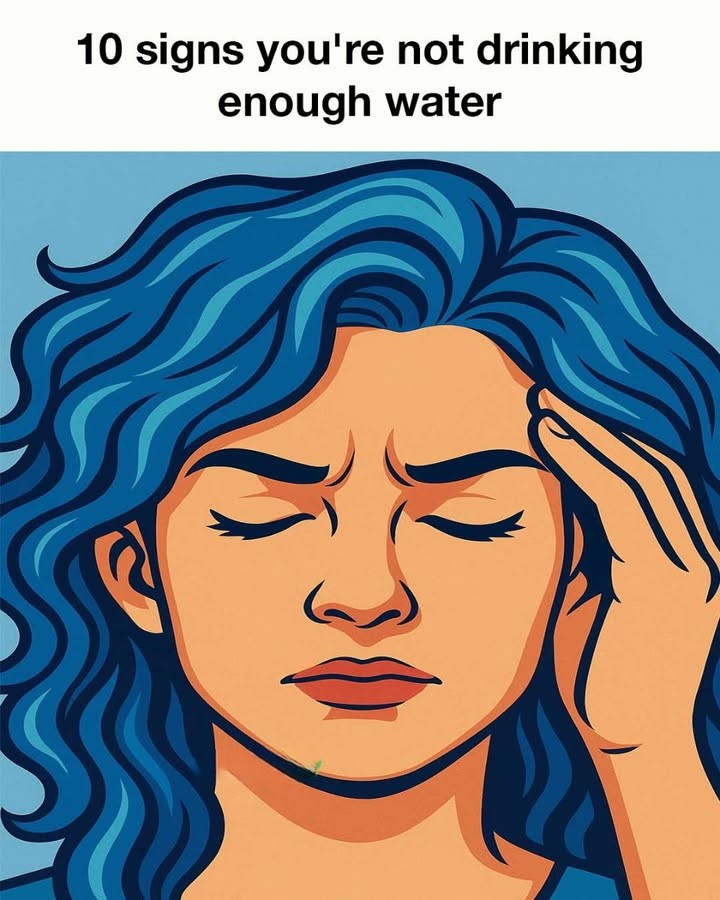Water is essential for life, making up about 60% of the human body. It plays a critical role in maintaining bodily functions, including regulating temperature, transporting nutrients, and removing waste. Despite its importance, many people do not consume enough water daily, leading to dehydration and its associated health issues.
Dehydration can manifest in various ways, some of which might not be immediately obvious. Recognizing these signs early can help prevent more severe health problems. This article explores ten common indicators that you might not be drinking enough water and offers tips on how to stay adequately hydrated.
1. Understanding the Importance of Hydration
Hydration is crucial for maintaining the body’s balance and ensuring that all systems function optimally. The average adult should aim to drink about 2.7 liters (91 ounces) for women and 3.7 liters (125 ounces) for men per day, including all beverages and food. Water helps regulate body temperature, lubricate joints, and transport nutrients to cells.
When the body is not adequately hydrated, it can lead to a range of health issues, from mild symptoms like dry skin and fatigue to more severe conditions such as kidney stones and urinary tract infections. Understanding the importance of hydration can motivate individuals to prioritize their water intake.
2. Dry Skin: A Common Indicator
One of the first signs of dehydration is dry skin. When the body lacks sufficient water, it prioritizes essential functions, leaving the skin less hydrated. This can result in skin that feels rough, flaky, or tight. In severe cases, dehydration can lead to more pronounced skin issues, such as eczema or psoriasis flare-ups.
To combat dry skin, it’s important to increase water intake and use moisturizers to help lock in moisture. Drinking enough water can improve skin elasticity and overall appearance, making it look healthier and more vibrant.
3. Persistent Fatigue and Lethargy
Feeling constantly tired or lethargic can be a sign of dehydration. Water is essential for the body’s energy production processes, and a lack of it can lead to decreased blood volume. This makes the heart work harder to pump oxygen and nutrients to cells, resulting in fatigue.
To alleviate fatigue, ensure you’re drinking enough water throughout the day. Incorporating water-rich foods, such as fruits and vegetables, can also help boost hydration levels and energy.
4. Frequent Headaches and Migraines
Dehydration is a common trigger for headaches and migraines. When the body is dehydrated, it can cause the brain to temporarily shrink from fluid loss, leading to pain and discomfort. Studies have shown that increasing water intake can help reduce the frequency and intensity of headaches.
If you experience frequent headaches, try drinking a glass of water and see if it helps alleviate the symptoms. Keeping a water bottle with you throughout the day can serve as a reminder to stay hydrated and potentially prevent headaches.
5. Dark Yellow Urine: A Warning Sign
The color of your urine is a clear indicator of your hydration status. Ideally, urine should be light yellow or straw-colored. Dark yellow urine is a sign that your body is conserving water due to insufficient intake. This can also indicate that your kidneys are working harder to concentrate urine.
To ensure proper hydration, aim to drink enough water so that your urine remains a light yellow color. This is a simple yet effective way to monitor your hydration levels and adjust your water intake accordingly.
6. Feeling Dizzy or Lightheaded
Dizziness or lightheadedness can occur when the body is dehydrated, as it affects blood pressure and circulation. When you don’t drink enough water, blood volume decreases, leading to lower blood pressure and reduced blood flow to the brain.
If you experience dizziness, especially when standing up quickly, it could be a sign that you need to drink more water. Staying hydrated helps maintain stable blood pressure and prevents these uncomfortable symptoms.
7. Experiencing Muscle Cramps
Muscle cramps are often associated with dehydration, particularly during exercise or hot weather. Water is essential for muscle function, and a lack of it can lead to an imbalance of electrolytes, such as sodium and potassium, which are crucial for muscle contractions.
To prevent muscle cramps, ensure you’re drinking enough water before, during, and after physical activity. Consuming electrolyte-rich beverages can also help maintain the balance needed for proper muscle function.
Next Page
